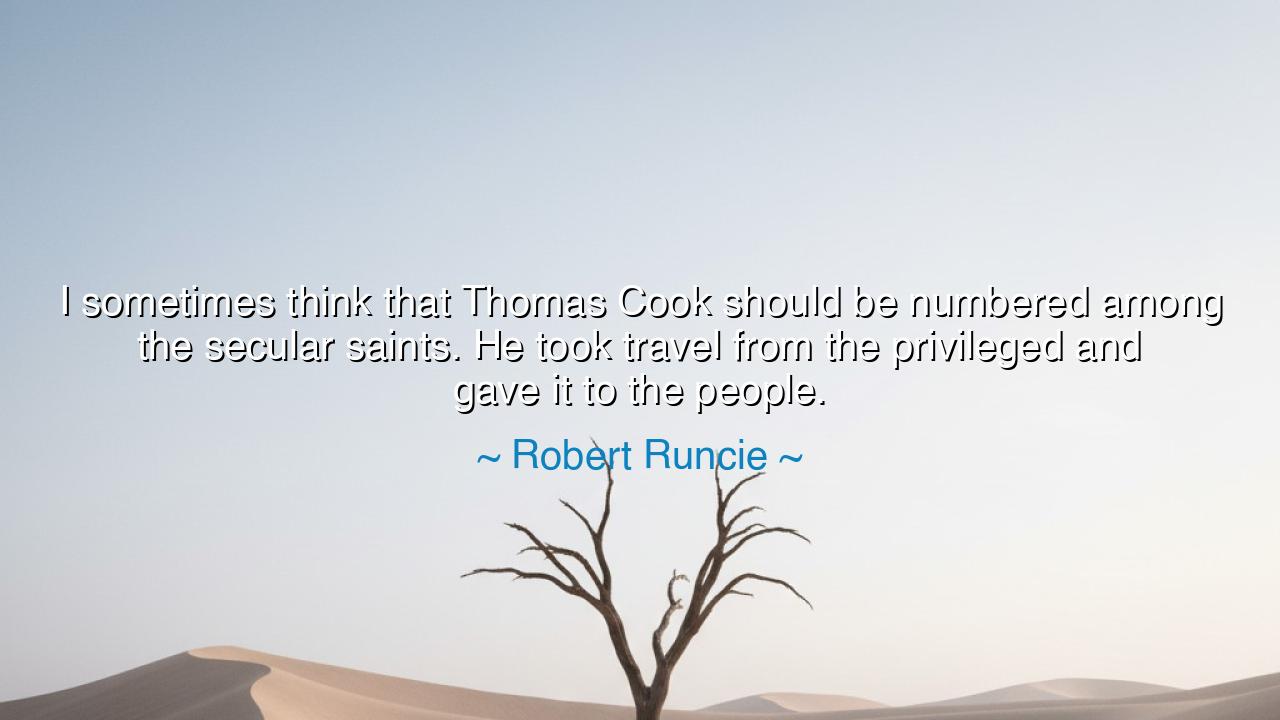
I sometimes think that Thomas Cook should be numbered among the
I sometimes think that Thomas Cook should be numbered among the secular saints. He took travel from the privileged and gave it to the people.






Robert Runcie, with a voice both reverent and practical, once declared: “I sometimes think that Thomas Cook should be numbered among the secular saints. He took travel from the privileged and gave it to the people.” In these words lies a profound recognition of a man’s legacy, not of swords or crowns, but of pathways opened and horizons widened. Runcie calls Thomas Cook a “secular saint,” for his gift was not in miracle or relic, but in democratizing the wonder of the world—granting to ordinary men and women the chance to step beyond their villages, their towns, their narrow boundaries, and behold the greater creation.
The origin of these words lies in the nineteenth century, when travel was the province of the wealthy. To journey abroad was a luxury for the aristocrat, while the laborer’s world ended at the edge of his parish. But Thomas Cook, a simple cabinetmaker turned visionary, created the organized tour, bringing trains and ships into the service of the common people. He broke the walls of exclusivity, and for the first time, clerks and teachers, seamstresses and miners, could look upon mountains, cities, and seas once reserved for the elite. In this sense, he was indeed a liberator, a giver of sight and experience.
The ancients, too, would have honored such a man. For in Greece, the Olympic festivals drew together men from all corners, not only to compete but to mingle and share in a common culture. In Rome, the roads of empire connected distant provinces, allowing a Gaul to walk the streets of the capital itself. Yet these blessings, though great, often still served the powerful first. Cook’s achievement was different: he made the journey itself an inheritance of the many, not the few.
History is filled with figures who democratized what was once the treasure of the elite. Consider Gutenberg, who by creating the printing press, took books from the hands of monks and nobles and placed them into the hands of the people. Knowledge, once a guarded jewel, became the possession of all who could read. Thomas Cook performed a parallel miracle with travel. He made the Alps, the Mediterranean, the Nile, not distant dreams but reachable realities. Thus Runcie, in calling him a secular saint, places him in the lineage of those who expand the horizons of humanity itself.
There is also a moral weight in Runcie’s declaration. To give people access to travel is to give them more than leisure—it is to give them education, perspective, humility, and wonder. When a man or woman stands in a foreign land, they realize that their own customs are not the only way, that beauty wears many forms, and that humanity is larger than their own small circle. Cook’s tours were not merely excursions; they were lessons in brotherhood, in the vast tapestry of mankind. This is why the Archbishop spoke not lightly, but with the gravitas of one who knew that such gifts uplift the human spirit.
The lesson is eternal: what is reserved for the few must be opened for the many. Whether it be travel, knowledge, art, or opportunity, the greatness of a society is measured not by how tightly it guards its treasures, but by how widely it shares them. Thomas Cook stands as a reminder that one person’s vision can transform privilege into a common inheritance, and in doing so, uplift generations.
Practically, this means we too must seek ways to open doors for others. Do not hoard your skills, your resources, or your blessings. Share them. Mentor the young, support access to education, create opportunities where barriers once stood. For just as Cook gave travel to the people, so too can we give pathways of hope, knowledge, and discovery to those around us.
Thus, Robert Runcie’s words remain as a hymn to the power of generosity: Thomas Cook, by taking travel from the privileged and giving it to the people, became not merely a businessman, but a secular saint. His legacy teaches us that the truest greatness lies not in keeping what one has, but in giving it away, until the wonders of the world belong not to the few, but to all.






AAdministratorAdministrator
Welcome, honored guests. Please leave a comment, we will respond soon